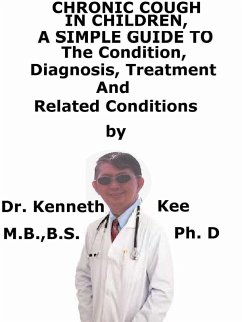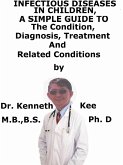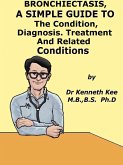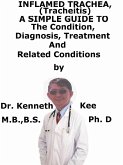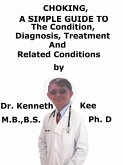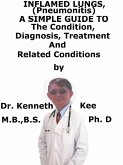Cough is a non-specific reaction to irritation anywhere from the pharynx to the lungs.
Childhood coughing is a frequent disorder that can cause anxiety in parents.
There are significant differences from adult cough in terms of possible causes and treatment guidelines.
Chronic cough in children is described as a cough that last longer than eight weeks.
This time period is used because most acute infective causes of cough will recover in 3-4 weeks, and the eight-week definition identifies those who may require more investigations.
Occasionally post infective cough may persist longer (3-8 weeks) as in the case of pertussis or post viral cough.
Young children may get repeat occurrences of viral respiratory tract infection up to 6-8 times per year and this may be mistaken for chronic cough.
These guidelines notice that the time period between acute and chronic cough (3-8 weeks) is sometimes called 'sub-acute cough' or 'prolonged acute cough' (e.g., a slowly resolving post-viral cough).
The three most frequent causes of chronic cough in adults (asthma, postnasal drip syndrome and gastro-esophageal reflux) are not always the most frequent in children
1.Most children with asthma have inflamed or swollen airways, which often cause repeat occurrences of episodes of cough, wheezing and shortness of breath
2.Postnasal drip produced by rhinitis or a sinus infection (sinusitis) can induce chronic cough.
Normally other symptoms such as nasal blockage and congestion or sneezing are present, but occasionally the only symptom observed is the cough.
3. In some children, the reason of chronic cough is stomach fluid moving back up the throat or reflux.
Some children may form a hoarse voice and choking as symptoms as a result od acid irritating the throat
4. Following a viral respiratory infection, healthy children can have a cough lasting for weeks.
5. Foreign bodies, such as toys and food, can be incidentally inhaled at any age, but most often happens at ages two to four years producing a prolonged cough.
Symptoms
1. Family history of lung disease.
2. Neonatal onset of cough.
3. Sudden onset of cough.
4. Hemoptysis (true hemoptysis - not, for example, nosebleeds or cheek biting).
5. Cough with feeding, dysphagia (swallowing difficulty), severe vomiting.
6. Chronic wet cough with sputum production.
7. Cough started and persisted after a choking episode
8. Cough that occurs during or immediately after feeding
Signs
1. Signs of chronic lung disease - e.g., clubbing.
2. Failure to thrive.
3. Abnormal voice or crying, inspiratory stridor.
4. Focal chest abnormality
Initial investigations:
1. Chest XRay
2. Spirometry
Further investigations:
1. Sputum sample
2. Allergy testing
Treatment
1. In a well child with no 'red flags', the doctor should avoid invasive investigations and to reduce the expectations and anxieties of parents.
2. Persistent cough induces repeated treatments and parental anxiety.
3. Environmental causes should be removed if possible - e.g., tobacco smoke.
Anti-tussive drugs are not normally advised
A cough protects the child's body by eliminating mucus, irritating substances and infections from his or her respiratory tract
If the child has a cough that persists more than two to three weeks, the parent should schedule a visit with the doctor.
Coughing that persists more than 8 weeks is indicated chronic.
An allergist is often the best specialist to find out the cause
Plenty of fluids should be consumed
Decongestants help to clear a runny nose and alleviate postnasal drip
Inhaling Steam can help to dissolve phlegm and clear the nose.
TABLE OF CONTENT
Introduction
Chapter 1 Chronic Cough in Children
Chapter 2 Causes
Chap...
Dieser Download kann aus rechtlichen Gründen nur mit Rechnungsadresse in A, B, CY, CZ, D, DK, EW, E, FIN, F, GR, H, IRL, I, LT, L, LR, M, NL, PL, P, R, S, SLO, SK ausgeliefert werden.

